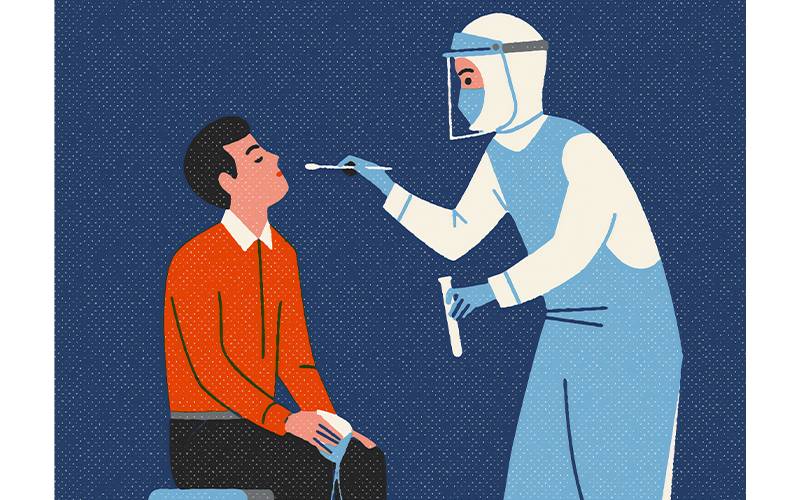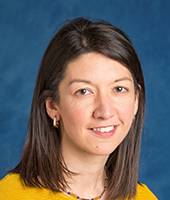Dr Laura Shallcross (UCL Institute of Health Informatics) is leading two studies to understand the burden and impact of COVID-19 in care homes. Find out more below.

Burden and impact of COVID-19 in care homes |
|---|
The COVID-19 pandemic poses a substantial risk to elderly and vulnerable people. The virus spreads easily in care homes, where one in seven individuals aged 85 years or older live. However, in the early stages of the pandemic there was no surveillance for COVID-19 infection in care homes, making it difficult to know the scale of the problem, and plan how to keep care home residents and staff safe.
Dr Laura Shallcross (UCL Institute of Health Informatics) is leading a one-year ESRC UKRI funded study, to understand the burden and impact of COVID-19 in care homes. This research builds on an existing collaboration with Four Seasons Healthcare (FSHC), one of the UK's largest independent health care providers.
Before the pandemic began, Laura had been working with FSHC to collect individual level data on all their residents, to understand patterns of antibiotic use across more than 250 care homes. As the pandemic progressed, Laura and her colleagues were shocked to discover there were no systems or research studies monitoring the impact of COVID-19 in care homes nationally, and saw an opportunity to build on their existing work with FSHC.
Since 1st May 2020, Laura and her team have been extracting weekly data and daily reports on COVID-19 cases, hospital admissions, deaths and the use of disease control measures across 200 UK care homes. This allows them to explore what proportion of care homes are having no outbreaks, what are the characteristics of care homes that were seeing a lot of cases, and provide some insights on geography, and staffing levels. Surveys and interviews with health care workers have also be used to find out what it’s like working during the pandemic, what is causing problems, and what might be put in place to mitigate the impact of future waves. Findings will be shared with FHSC, GPs and Public Health England, patients and the public, and support the national response to COVID-19.
Vivaldi DHSC study |
|---|
Building on this ESRC COVID-19 research, Laura is now working with the Department of Health and Social Care, and NHS Data Foundry on the £4m Vivald study to test staff and residents in all FSHC care homes in England (106 care homes and 10,000 staff and residents). Data on symptoms and their duration will be collected alongside repeat infection testing to better understand the spread of COVID-19, and how it clusters in care homes.
The research will involve baseline serological sampling of staff and residents - a blood sample test to see whether they have had COVID-19 in the past. This will be followed up with several rounds of swab testing for current infection, and antibody testing, which indicates past infection. The findings will allow Laura and her team to track who and how many people have COVID-19, how this virus spreads in care homes, as well as understand past exposure and possible immunity among staff and residents.
Laura is also planning qualitative interviews with up to 60 FSHC care home workers to try to gain an understanding of how test results are used, what they understand by them, and how they are informing infection control practices. This data will also be linked with national data on hospital admissions and deaths, to explore how often the virus comes into care home due to a resident being discharged from hospital, how many staff are infected and the frequency that they’re exporting COVID-19 back into the community. Interrogation of national data will also help rapidly inform policy around England’s testing strategy.
 Dr Laura Shallcross
Dr Laura Shallcross

Consultant in Public Health Medicine
UCL Institute of Health Informatics
Faculty of Population Health Sciences
Biography
Laura studied medicine at Oxford University and Guy's, King's and St Thomas's Medical School. She subsequently combined training in Public Health Medicine with a 4 year MRC pre-doctoral fellowship which funded her MSc in Epidemiology at the London School of Hygiene and Tropical Medicine and PhD at UCL, supervised by UCL Health of the Public co-Director Professor Dame Anne Johnson, and Professor Andrew Hayward. She currently holds a NIHR Clinician Scientist Award entitled “Precision Antibiotic prescribing for urinary tract infection in hospital”. Her research focuses on the use and integration of electronic health records with omics datasets to improve the management of infectious diseases, with a particular interest in antimicrobial prescribing and resistance. Laura is a member of the Government’s Scientific Advisory Committee of Antimicrobial Prescribing, Resistance and Healthcare Acquired Infections (APRHAI).
 Close
Close

